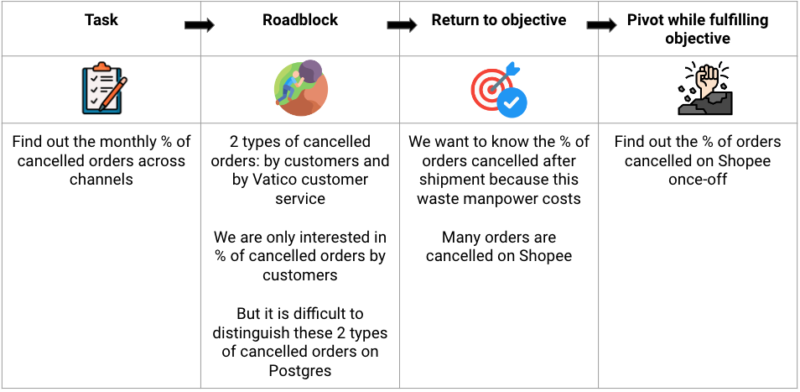Blog - Hướng dẫn, Training Data
End of 3 months internship reflection
I embarked on a data analytics internship expecting to take away something technical but my takeaways were more macroscopic in nature. The most important thing I learnt was how to solve problems through a problem-solving framework which I co-created with the Data Lead. Other salient takeaways include the importance of planning and the process of iteration, which I learnt in my first two weeks at Vatico. As my stint at Vatico comes to an end, I would like to share three crucial learning points:
- Never lose sight of the objective
- Understand the situation on the ground
- Execute with finesse
Never lose sight of the objective
During my data analytics journey, I often encountered roadblocks which tested my abilities to use data to solve a business problem. Difficulties which I have experienced include technical challenges, unavailable data, and time lapse when syncing databases. At times, I felt tempted to change the business objective in order to let the data solve the problem.
Let me give an example.

Referencing the table above, when tasked to find out the monthly percentage of canceled orders by customers across channels, there were limitations in the data, leaving me at a loss of what to do. I wanted to proceed with querying for the monthly percentage of canceled orders and ignore the fact that some orders were canceled by the customer service department.
However, I remembered the Data Lead sharing with me that data analytics is to support business needs. We should never change our business goals due to limitations in data. I thus returned to the original objective, that we wanted to know the percentage of orders canceled after shipment because this wastes manpower costs. Knowing that many orders are canceled on Shopee, I thus pivoted to find out the percentage of orders canceled on Shopee once-off.
At the end of the day, data analytics serves to support business needs. Regardless of the technical challenges, we should never lose track of the problem and objective.
Understand the situation on the ground
As we strive to fulfill business needs with data, I grasped the importance of being involved in the business and the product so that I can perform my job more effectively.
Although I am from the Data Analytics team, I often chat with members from the Marketing, Operations, and Customer Service teams so I know what is happening on the ground. This informs my job as a data analyst. For instance, when I query for cost and revenue metrics, I know what are the relevant filters to apply in my code.

Being a more hands-on data analyst also allows you to empathize with your users better. A key aspect of problem-solving is to begin with the problem, not the solution. By knowing the pulse on the ground, I can better understand the pain points and appreciate the depth of the problem. For instance, when I was tasked to automate the monthly key performance indicators (KPIs) report by creating a dashboard, speaking to my colleague who manually does the report made the objective of the task more salient. This allows me to describe the problem clearly, bringing me one step closer to solving a problem.
Execute with finesse
Although the primary responsibility of a data analyst is to gather insights to solve a particular business need, I learnt that the importance of a working SQL script pales in comparison to the sophisticated planning needed to make insights scalable across business units and sustainable across time. At Vatico, we are not a data factory. Instead, we pioneer best practices informed by past practices. Please refer to the following blog posts to see how the Vatico data team executes with finesse and changes its systems and processes in light of evolving business needs:
- Why does Vatico use a data warehouse?
- From MySQL to Postgres: How Vatico changes the softwares used in light of changing business needs
- Data in Vatico: Shift from ETL to ELT
Even as the internship ends, it is only the start of me chasing my passion in data analytics. As I embark on this journey, I am confident that these precious takeaways will continue to ground and guide me so that I can soar higher.



